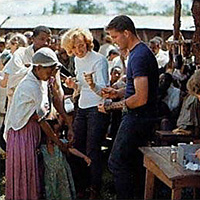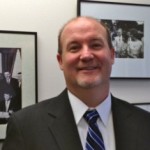Peace Corps faces uncertain future with no Volunteers in field
Thanks for the ‘heads up’ from Marnie Mueller (Ecuador 1963-65)
Peace Corps faces uncertain future with no Volunteers in field
BY REBECCA BEITSCH – 04/16/20 06:00 AM EDT 36
The Peace Corps has found itself in uncharted territory after evacuating all 7,300 of its volunteers worldwide due to the coronavirus pandemic.
The agency, which places volunteers in more than 60 countries, has never before evacuated its entire volunteer roster, leaving questions about what lies ahead for evacuees and how the Peace Corps plans to rebuild once the outbreak subsides.
Volunteers, who typically spend two to three years living and working in impoverished communities, had in some cases just a day’s notice to evacuate aafter Peace Corps made the move official last month.
“When someone tells you you have one day to pack up three years of your life into two suitcases, it’s just so overwhelming but also so emotionally draining you almost feel nothing at all,” said Loren Reese, 24, who served in Jamaica.
The abrupt evacuation has left many Peace Corps volunteers in precarious situations. Many are footing hotel bills to quarantine away from vulnerable family members, and they’ve all lost their jobs at a time when the U.S. economy is at a standstill.
“I left a lot of stuff behind to commit to the two years of service,” said Kevin Lawson, 35, who was evacuated from Ukraine. “I left my job, I left my place to live, I sold my car, I got rid of everything. So now to come back earlier than expected, I’m really left with this feeling of being lost.”
Peace Corps has pledged to reinstate almost every volunteer who wishes to return to service. But with the pandemic still raging around the world, it’s unclear when that might happen.
“Since the pandemic is in its early stages in much of the world, there is a lack of specific information to adequately predict when it will be safe for volunteers to return to the field,” Peace Corps wrote in an email to volunteers obtained by The Hill. “It is unlikely that we would be able to place volunteers in the countries of service before September 30, 2020.”
Many volunteers say they want to return.
“Whoever takes me I will go back instantly,” said Sabrina Smith, 34, who left her job as a teacher to serve in North Macedonia, though she’s open to returning to any country.
“I had settled in my mind to dedicate these two years of my life to service.”
But reinstatement will take time, and the agency is liable to lose interest from evacuated and pending volunteers. Peace Corps is still accepting applications for volunteers for assignments starting in January, and attracting new volunteers may prove key for keeping the agency afloat.
A sustained absence of volunteers in the field could harm the agency in the long run, particularly under an administration that has consistently proposed budget cuts.
“Our concern is when we get down the road six months or so and conditions have not allowed Peace Corps to return volunteers to the field due to conditions, our fear is it becomes increasingly vulnerable,” said Glenn Blumhorst, president of the National Peace Corps Association, an advocacy group.
Evacuated volunteers share that fear.
Lawson, who was forced to leave Ukraine, said he worries that the Peace Corps won’t be a priority for the Trump administration once things open back up.
“When this does settle and when countries try to get their economies going again, I worry Peace Corps would be this easy thing to not worry about,” he said. “I’m afraid if this administration takes that mindset, Peace Corps would not be at the top of that list.”
In a statement to The Hill, the Peace Corps said evacuated volunteers “have faced extraordinary challenges, but they possess uncommon grit and fortitude that will benefit our country—and countries around the world—for decades to come. They have so much to offer, and we are here for them as they discern next steps in their lives.”

Patti and John Garamendi as PCVs in Ethiopia
Rep. John Garamendi (D-Calif.), who served as a volunteer in Ethiopia with his wife, who herself was later responsible for Peace Corps recruitment and planning during the Clinton administration, said his congressional office has been contacted by countries with a Peace Corps presence eager for volunteers to return.
Sen. Chris Van Hollen (D-Md.), who introduced legislation to support evacuated volunteers, said, “I think going forward with what we know of how interconnected the world is, what happens overseas can certainly happen here at home, and their mission is vitality important not just to the people they serve overseas but to people here in the U.S.”
While a post-coronavirus Peace Corps might include more public health work, Van Hollen and Garamendi in the near term are calling for an expansion of the AmeriCorps program as a way to battle the virus in the U.S. — a role they think evacuated Peace Corps volunteers would be perfect for.
“In order for the country to reopen we’re going to need to have a major public health program of testing and follow up,” said Garamendi, who is also chair of the Congressional Peace Corps Caucus. “The Peace Corps volunteers that came back are a perfect fit for that.”
Van Hollen’s bill would expand AmeriCorps and give returned Peace Corps volunteers priority placement.
Separately, the Maryland Democrat is trying to ensure evacuated Peace Corps volunteers are eligible for benefits in the $2.2 trillion coronavirus relief package signed into law last month. Volunteers have long been blocked from receiving standard unemployment benefits.
Access to those benefits would be helpful for evacuated volunteers like Reese.
“I’m not in a position to financially support myself until this is over, and once I go home I can’t leave until this is over,” said Reese, who has already spent considerable sums to quarantine at an Airbnb until she can join her family, including her severely immunocompromised father.
She said volunteers would be good stewards of any unemployment funds.
“You know, Peace Corps volunteers, we live on very humble stipends and because of that there’s two things: We don’t have much to come back to or to fall back on, but we really know how to budget.”
But for many volunteers, the shock of the abrupt evacuation is still very raw.
“It was really heartbreaking cause you’re thinking of all the people you didn’t say goodbye to, all the projects you had just started that are now in limbo,” said Smith.


As of April 13, EPCVs were being directed to their host country PC staff for non-emergency medical and health questions. Peace Corps published the emails for staff in each host country. The host country staff is still employed. What the future of these administrative offices is, I don’t know.
The PC survived many decades. Now it may join JACK in the grave. Here is a memory: I first met the then Senator John (Jack) Fitzgerald Kennedy in early summer 1960 in Cambridge, Massachusetts (when he was seeking the Democrat Party nomination for U.S. President) at WGBH-TV on the M.I.T. campus (where it was then housed) when I was a Lowell Council for Cooperative Broadcasting intern and graduate student at Boston University Graduate School for Public Relations and Communications (as it was then named) when he was interviewed by Louis Lyons (curator, Harvard’s Nieman Foundation for Journalism) on the twice-weekly New England News quarter-hour news and interviews where Lyons was the host and I was the technical director.
I was 23, up from graduate study in government at the then-named North Texas State College in Denton.
The next time Jack Kennedy came to WGBH-TV was in the autumn after he’d been selected as the Democrat Party candidate for President.
The third time I met him was in the White House late August the next year first in the Rose Garden following which for individual photographs in the Oval Office. I was in the Ghana group that flew out after that from Washington, D.C. afternoon in a two-engine Convair (with stops in the Azores for refueling and in Dakar, Senegal for supplies) to Accra, Ghana where we were to teach in secondary schools and I was assigned to a new one outside Acherensua a village in the Brong-Ahafo state (part of the old Kumasi kingdom) in the rain forest near the eastern border with the Ivory Coast.
I saw him next in Dallas on Elm Street riding with the First Lady his wife two blocks before he was shot.
Today I can still see them, Louis Lyons and Jack Kennedy, from on the other side of the small glassed-in control room looking out into the slightly larger one where Lyons would interview and report.
WGBH was a small station in a two-story brick building that I’d heard had formerly housed a roller rink. Next to it was the Kresge auditorium and the famed chapel where we did big interviews such as the one I floor-managed with Aldous Huxley as the guest. He was nice as nice to me and spoke so vituperatively of Richard Nixon. Over one building was the Charles River and the Massachusetts Avenue bridge to Boston from Cambridge. WGBH is no longer in Cambridge, but moved years ago to the Boston and Boston University side of the Charles.
© Copyright Edward Mycue June 1, 2017
I’m concerned that the ultra conservative vultures are planning to begin circling overhead the Peace Corps’ offices even as we worry about its future. By laying off all of the evacuated PCVs, rather than making an effort to furlough them, the Peace Corps has created an opportunity for its detractors to attempt to find a way to do significant damage to the agency, if not destroy it. We cannot allow that to happen in our lifetimes, so we must do whatever we can to save the Peace Corps.
When anyone asks if I am a veteran , I reply, yes, of the only corps that is dedicated to helping our fellow man instead of killing him. .
We must not only save this institution but make our citizen realize that this is the way we should effect the rest of the world. ,
The draft should be reinstated . Every citizen should have to serve, to develop and establish basic amenities like good health , running water, electricity, decent thousing, and a safe living environment.
This is the only way to solve the immigration dilemma.